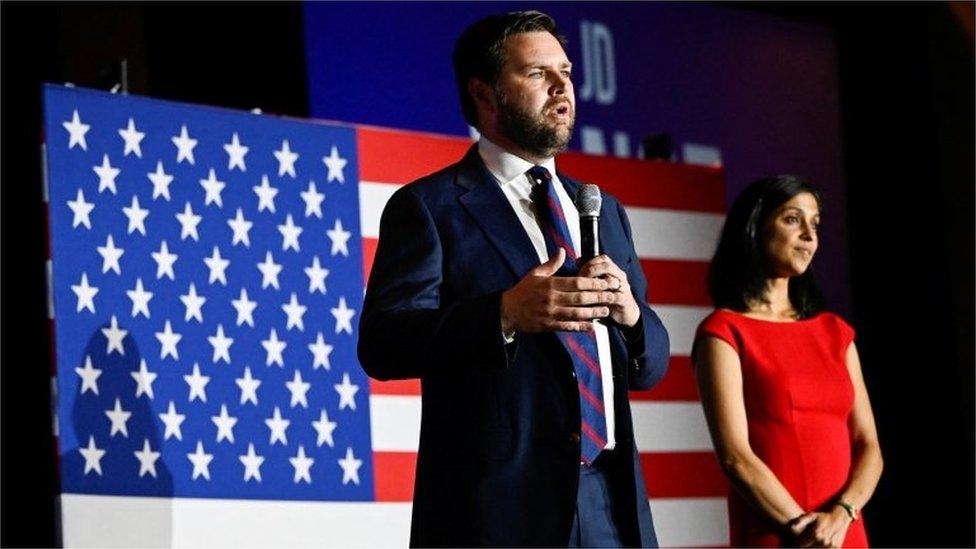JD Vance: Trump-backed contender clinches Ohio Senate race
- Published

Mr Vance campaigned with his own spin on the former president's populist rhetoric
A candidate endorsed by Donald Trump has won the Republican Senate nomination for Ohio, in a sign of the former US president's continued influence on his party.
Author and venture capitalist JD Vance beat six other candidates in a race that set a record for the most money, $66m (拢52m), ever spent on an Ohio election.
He trailed his more established political opponents for much of the primary campaign but saw a late surge following Mr Trump's endorsement.
Mr Vance is best known for authoring the 2016 book Hillbilly Elegy, which was later made into a feature film.
The book was about his upbringing in a small Kentucky town and the plight of poor rural white Americans.
It was heralded as a clear-eyed look at the political and cultural environment that helped explain Mr Trump's appeal in rural and struggling industrial states.
Mr Vance also benefitted from more than $10m in campaign support from billionaire technology entrepreneur Peter Thiel, one of Mr Trump's deep-pocketed allies.
Mr Vance will now face Democratic Congressman Tim Ryan, who represents a former factory-dependent district in eastern Ohio, in the mid-term elections in November. It sets up a high-profile battle for the allegiance of blue-collar voters in this Midwestern state.
In his victory speech before a small but festive Cincinnati crowd - some adorned in Mr Trump's red "Make American Great Again" hats - Mr Vance thanked the former president for his endorsement and underlined the importance of his victory for Mr Trump's agenda.
"They wanted to write the story that this campaign would be the death of Donald Trump's America-first agenda," he said. "It ain't."
Mr Vance campaigned with his own spin on the former president's populist rhetoric, repeatedly criticising what he viewed as unfair trade competition from China and the threat undocumented migration posed to the safety and economic livelihood of Americans.
Of the five top candidates, four fashioned themselves as disciples of the Trump political legacy. Runner-up Josh Mandel, a former Ohio state treasurer in his second bid for one of the state's Senate seats, made challenging the 2020 election results - an unrelenting obsession of the former president's - one of his top talking points.
Mr Mandel received endorsements from many Republican leaders and groups, including Texas Senator Ted Cruz and the influential conservative group Club for Growth. Some of his supporters furiously lobbied the former president not to endorse Mr Vance, who was viewed as an outsider in Ohio politics. That outsider status, however, may have helped secure the candidate's victory.
"People who are caught between the corrupt political class of the left and the right, they need a voice," Mr Vance said on Tuesday night. "And we're going to give it to them."
Nicholas Contras, a retired lawyer from Cincinnati who attended Mr Vance's celebration, said it was the candidate's anti-establishment status that won him over. The author, he said, could "stand up to the Washington swamp" - echoing the kind of rhetoric and sentiment that powered Mr Trump to victory in mid-western states like Ohio in 2016.
This race was the first test in a month that will go a long way toward demonstrating the power Donald Trump's endorsement has in Republican politics. In two weeks, another Trump-endorsed celebrity candidate, television doctor Mehmet Oz, will stand before voters in a tight field for the Republican Senate primary in Pennsylvania. The following week in Georgia, a Trump Senate pick, former football star Herschel Walker, appears headed for victory, while his choice for governor, David Perdue, trails incumbent Republican Governor Brian Kemp by a sizable margin.
At the moment, Republicans across the US continue to demonstrate respect for, or fear of, Mr Trump's political influence more than a year after he left the White House under a cloud of controversy. Over the four years of his presidency, he filled out much of the Republican establishment with loyalists and ideological acolytes. If he can continue to do so through these upcoming mid-term elections, it will be a strong sign that his grip on party power is enduring.